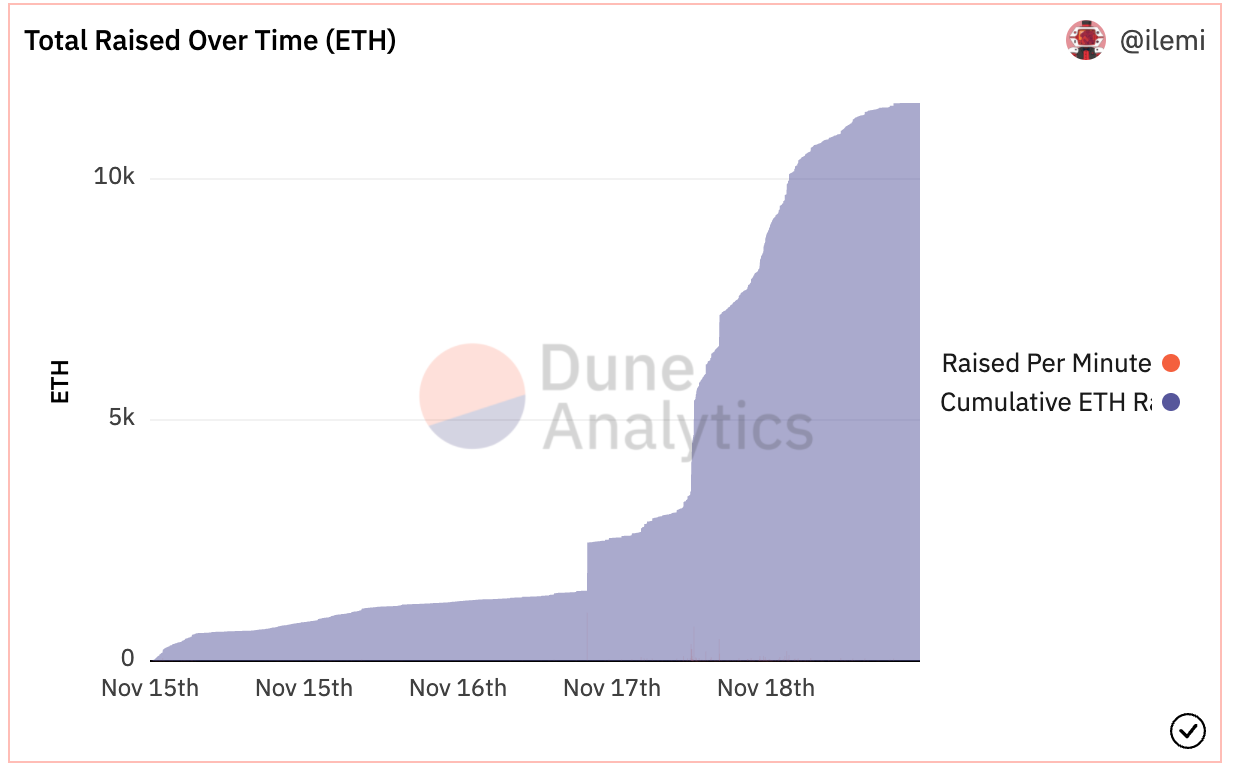A More Perfect Meme: Lessons from ConstitutionDAO
Memes, money and the future of the internet.
Hi Friends,
Welcome to the second issue of Charterless! Let’s talk MemeDAOs.
To the annoyance of my friends and family, I have been known to break into rants about how internet memes have become the most powerful force in our information ecosystem.
TikTok trends determine the top songs on Spotify. Wall Street Bet traders use memes to bend market valuations of AMC and Gamestop. Even in warzones, Ukrainian officials use memes to mobilize resistance to Russian aggression.
Memes are the internet’s native form of communication. So it was only a matter of time before the internet’s native language and its native (crypto) currency joined forces to create a truly internet native organization: the MemeDAO.
This is the story of the first of the MemeDAOs. This is the story of ConstitutionDAO.
And, like any good viral meme, our story begins with a share to a group chat.
Humble Origins
It was the second week of November 2021 when Graham Novak heard an NPR story about the Constitution. Sotheby’s was preparing to auction one of the only 13 original copies remaining. The Auction House estimated the document would fetch somewhere between $15 and 20 Million at auction.
Graham sent a joking message to a few group chats of fellow crypto enthusiasts: “What if we organized a group to buy the Constitution?” After all, a few weeks before, a DAO had bought the only copy of a Wu-Tang album for $4M. How hard could it really be?
The message might have fetched a thumbs-up or a single “haha” and that would have been that. But a few of his friends got excited. There was something infectious about the idea.
The idea spread through group chats containing some of Web3’s most influential thinkers, tweeters and builders. They quickly organized their own Continental Zoom Congress. There a rallying cry took hold: "We're really doing this."
You might be saying to yourself at this point: “Cool, so it’s a Kickstarter. Why do we need crypto or a blockchain for that? Isn’t this just more B.S. hype?”
And I would have to agree. DAOs do not introduce a net-new technology. You can set up a company and raise money for it by selling control with regulation crowdfunding or selling benefits with Kickstarter.
But because they are not forced to comply with the rules or standards of banks, governments or credit cards, they can move much faster, raise much more from a larger audience and do so at a cheaper price. They can raise money at the speed of memes.
And they did. In a week, ConstitutionDAO had raised over $43M. The most successful Kickstarter of all time has raised $29M.
How to spread a meme
How do you go from a texted joke to a $43M single-purpose fund in a week? If you do it right, you get an exponential growth curve that looks like this fundraising curve:
To do that, you’re going to need a lot of virality. Virality is a function of how many people a member of the community exposes to the meme, and how many people join the community as a result. If this sounds familiar from COVID, that’s not an accident. Viral marketing uses epidemiological tools.
To get this thing started, you’re going to need founders with a large audience to kick-off virality. None of the founders of ConstitutionDAO were household names. But they did have an engaged following on Crypto twitter. And this was critical for bootstrapping the community. Their Discord grew to 2600 members in 36 hours.
Once they had that community in place, they could begin to weaponize them for growth. Their chosen weapon: obviously, the memes. The trick now was to get their members to expose as many people as possible to ConstitutionDAO memes and to gradually make these memes as accessible as possible.
Here’s how they did it:
They had a simple idea that was explainable in a single sentence: "Raise 20M together. Own the Constitution." They repeated it a lot.
ConstitutionDAO members remixed a popular crypto-meme by adding(📜, 📜) to their Twitter handles. Suddenly crypto and tech twitter were full of 📜’s. The FOMO was palpable.
The expression “WAGMI” - We Are All Going to Make It — had become popular as a way of affirming support on crypto-twitter. So the ConstitutionDAO modified it: “WAGBTC” - We Are Going to Buy the Constitution. Their members posted it everywhere.
And, of course, they repurposed classic internet memes from Nic Cage to Mean Girls to Midwits.
With a mixed-meme-marketing strategy, and a base of 2600 community spreaders, the DAO spread like wildfire. First timers were buying crypto just to join in the movement and achieve their collective goal of owning the Constitution.
But the rapid growth papered over the group’s very disorganized core. When you’re sending around a meme, the totality of your investment is buying into the joke. But why, on Earth, would people send strangers $40M in cryptocurrency?
The Problem With Living Outside the Law…
If you know one thing about crypto-land, it’s this: rules don’t really exist here.
But we left the state of nature for a reason. To do anything interesting, you need to work with others. And to work with others, you need to find ways to trust other people.
This is why we create governments. They keep bad actors at bay, enforce property rights, and generally allow society to flourish.
ConstitutionDAO had no LLC. It had no bank account. There was no way to regulate it. This let it get off the ground quickly, but it also meant its leaders needed to find a way to establish their credibility to raise money.
The bet of crypto-culture is that we can use alternatives to government to enable individuals to reliably interact with each other. ConstitutionDAO relied on two mechanisms to achieve trust: reputation staking and transparency.
Every person who participated in authorizing transactions for the DAO was publicly identified. So, at least, the community would know who to blame if things went awry. As the leaders were prominent in the community, they had a lot to lose if they stole from the community. They publicly staked their reputation on the group’s credibility.
Next, the group's transactions and decisions were all made in public. Every transaction lived on the blockchain for anyone to view. Every decision existed in the Discord. By keeping everything in daylight, the leaders of the community made it easier to trust that nothing nefarious was going on.
Before going forward it is very much worth stating that ConstitutionDAO’s protections worked. Nothing illicit happened.
But this does not detract from the reality that this market is very much a “Buyer Beware” kind of system.
MemeDAOs sacrifice organizational safeguards in the interest of speed. If leaders had decided to abscond with the funds, they could have easily cooperated to defraud members. After all, with no LLC in place, there was no company to sue. With no bank attached, there was no bank account to freeze. There was not even a signed contract that “stealing” would have violated.
“OK,” our more crypto-enthusiastic community members might say, “But the group was new! They would have gotten around to that!”
Fair enough, but here’s the thing: even if they wanted to put more structure in place, there was no system for doing so. There was no CEO. There were no rules about how member voting would work. ConstitutionDAO depended on the faith of its members.
To put it another way: a community famous for its libertarian distrust of institutions had to rely on trusting total strangers with over $40M without any kind of safeguard.
Defeat and Dissolution
It also, unfortunately, did not achieve its goal. ConstitutionDAO did not win the Sotheby’s auction.
Their treasury was totally transparent to all other bidders. So when the time came to bid, the group was easily outbid by a billionaire who could view the group’s dashboard to see the exact maximum bid they could afford.
And this defeat created a new challenge. Having not fulfilled their mission, what exactly should they do with everyone's money?
The leaders opted to offer refunds to members. But donors have only claimed 55.79% of their funds. High Ethereum transaction fees make retrieving smaller donations prohibitively expensive. So small donors were basically Shit Outta Luck.
So yes, crypto-skeptics, it’s worth saying that this would not have been a problem on Kickstarter.
—
If you’ll excuse my American History nerdery, the ConstitutionDAO was not the perfect union. In fact, it probably bears a lot more in common with America’s first attempt at self-governance, the Articles of Confederation. It was hastily organized and ultimately failed to achieve its goal.
But even so, it taught the next generation of memetic statesmen and stateswomen some valuable lessons. MemeDAOs are going to be a powerful force.
I, for one, remain optimistic. The challenges that ConstitutionDAO faced are not insurmountable. A More Perfect MemeDAO is coming, and the world will be a better, stranger place for it.




